
Certificates and Licenses
Welcome to the Certifications and Licenses section! Here, I present a comprehensive list of some educational and professional achievements, taking into account my career transition from television to telecommunications.
These certifications and licenses reflect my dedication to professional growth and my commitment to staying abreast of industry advancements. They demonstrate my adaptability, transferable skills, and readiness to excel in the field of telecommunications. Please find below my relevant certifications and licenses:
During this program of study, I gained advanced knowledge in telecommunications network engineering. The comprehensive curriculum equipped me with a deep understanding of network design, implementation, troubleshooting, and optimization. This diploma has allowed me to excel in the rapidly evolving field of telecommunications.
Advanced Diploma of Telecommunications Network Engineering
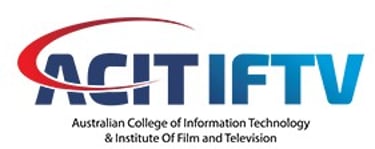







September 2021 - May 2022 | Australian College of Information Technology (ACIT)
To strengthen my foundation in audio-visual communication, I pursued an advanced diploma from Santo Tomas University in Santiago, Chile. This program provided me with practical skills and theoretical knowledge in areas such as video production, multimedia design, and video-audio editing. It allowed me to develop a keen eye for visual storytelling and effective communication through various digital media platforms.
Digital Audiovisual Communication Advanced Diploma
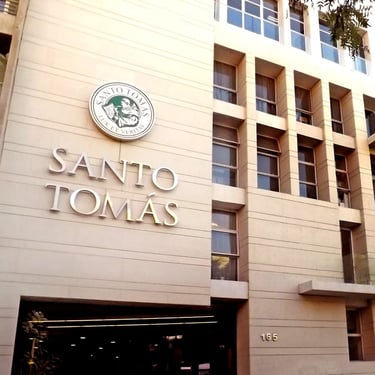
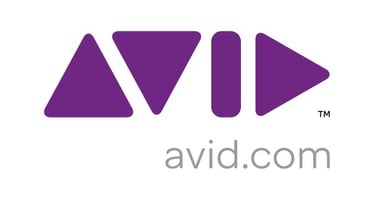




Santo Tomas University Santiago Chile | 2008-2010
Recognizing the importance of language proficiency in a globalized world, I undertook a full-time English course at Pacific English Study in Gold Coast, Australia. This immersive experience allowed me to enhance my English language skills, particularly in areas such as speaking, listening, reading, and writing. The course enabled me to effectively communicate and collaborate in multicultural environments.
General English Full-Time Course






Upper Intermediate | Pacific English Study | Gold Coast, Australia | 2019
This credential earner has demonstrated foundational knowledge of workstation and laptop internal components, ports, connectors, and external peripherals. The individual can identify notational systems and describe how to install, set up, and modify a Windows operating system, use keyboard shortcuts, troubleshoot storage and memory issues, and update device drivers. The earner can describe recommended installation steps, the CompTIA troubleshooting model, and key business continuity practices.
Hardware and Operating System Essentials
Issued by Coursera Authorized by IBM
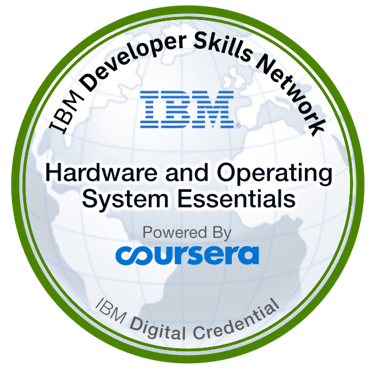

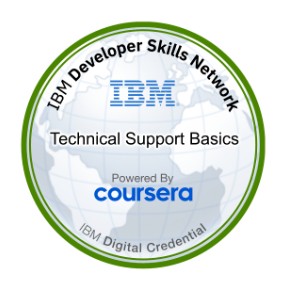

This badge earner has demonstrated a foundational knowledge of technical support and can identify and discuss areas of technical support, roles, responsibilities, IT infrastructure, customer service mindset, industry certifications, support tools, support tiers, service-level agreements, and ticketing systems. The badge earner demonstrated the ability to evaluate technical and soft skills, classify support tickets, use an escalation matrix, and describe connecting to a remote computer.
Technical Support Basics
Issued by Coursera Authorized by IBM
Most data science training focuses only on key technologies. But real-world data science jobs require more than just technical acumen. When new data scientists change their focus from the classroom to the boardroom, they must be able to empathize, persuade, and lead others if they want to successfully run projects that produce business transformation. This course was designed to help you learn these, and other, nontechnical skills that can help you convert your first data science job into a successful, lifelong career.
There are predictable challenges to be overcome when predictive models introduce change in organizations. Throughout this course, instructor Keith McCormick goes over these challenges and shows how to overcome them. Discover how to confidently defend your turf at work, enhance your own natural curiosity, deepen your commitment to your craft, effectively translate the language of analytics to the language of business, practice diplomacy, and more.
The Non-Technical Skills of Effective Data Scientists
Linkedin Learning Certificate of Completion
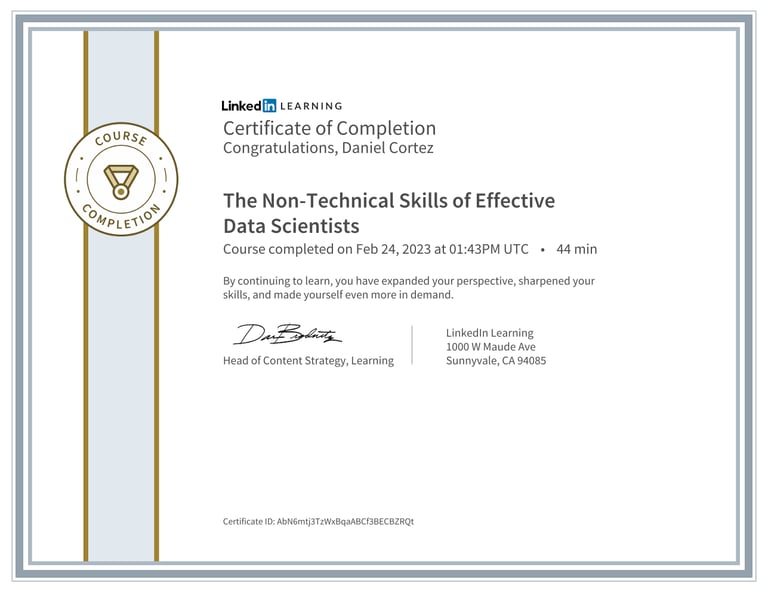

With so many technical terms, cultural quirks, and options to pursue, getting started with Linux can seem overwhelming. In this course, instructor Scott Simpson covers the fundamentals of what you need to know in order to make smart choices about learning Linux. Scott discusses the Linux kernel, the software that allows you to interact with a computer’s hardware. He explains desktop environments, text-based terminal interfaces, and standard tools that are used on a Linux system. Scott goes over where different types of files are stored on Linux systems. He offers tips on choosing which Linux distribution, or distro, to use and helps you plan your Linux system. Scott shows you how to direct your strategy for learning Linux, then gives some tips on how to find answers and ask for help.
Introduction to Linux
Linkedin Learning Certificate of Completion
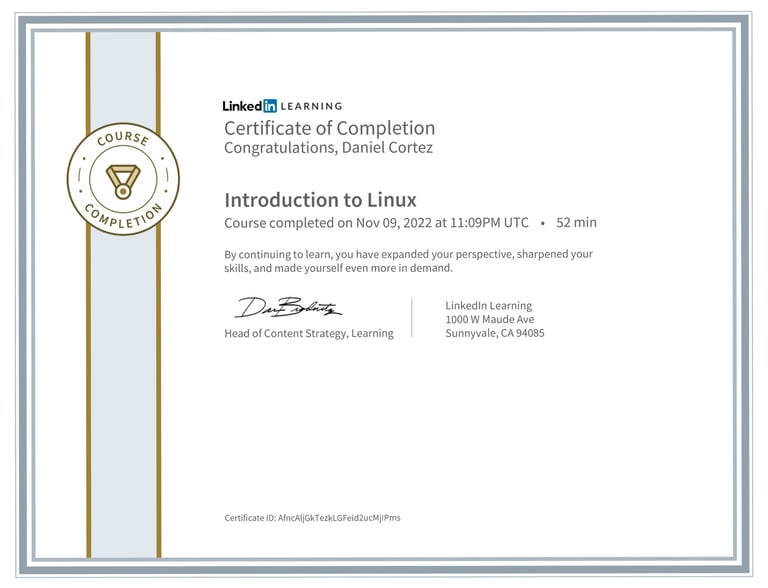

Microsoft 365 is a bundled suite of SaaS applications and services that businesses can subscribe to. It offers Windows 10, Office 365, and Enterprise Mobility + Security, all packaged together. Once configured properly, this portfolio of products can enhance your enterprise’s security and productivity and help you meet your compliance requirements. In this course, Ed Liberman provides a thorough guide to all of the features, capabilities, and opportunities within Microsoft 365. He unpacks major topics like managing users and identities, security, compliance, and reporting, and he gives you clear demonstrations of each chapter’s main points. Ed shows you how to administrate Microsoft 365, as well as how the applications and services within the suite fit together.
Microsoft 365 Essential Training for Administrators
Linkedin Learning Certificate of Completion
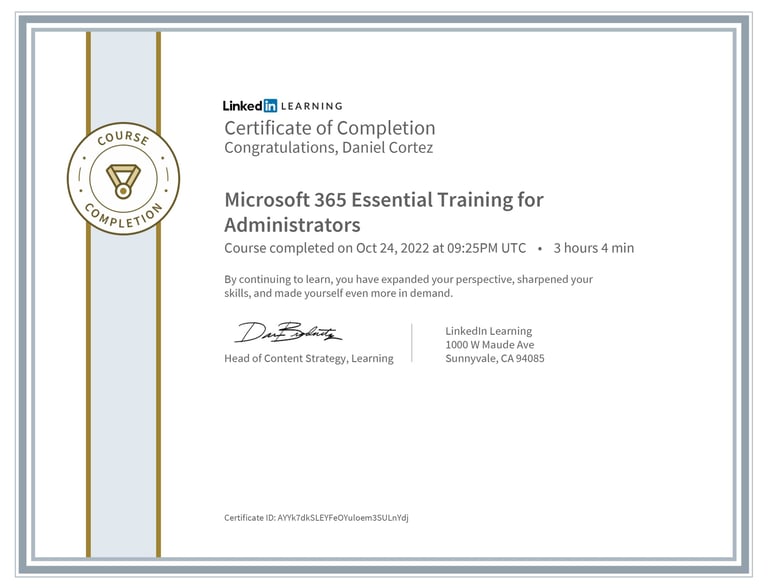

When someone begins to study networking, they’re challenged with knowing where to start. This is due to the wide spectrum of technologies falling under the umbrella of networking. This course provides an overview of the foundational topics any networking professional should know, as well as an introduction to emerging technologies. Instructor Kevin Wallace delves into the purpose of networks, as well as how networking technologies benefit us in both our personal and business lives. He covers network addresses, including the structures of Internet Protocol (IP) version 4 and version 6 addresses. Plus, learn about switches, routers, fiber-optic cabling, and other essential pieces and parts that make networks work; the OSI model; common network services; wireless networks; and more.
Networking Foundations: Network Basics
Linkedin Learning Certificate of Completion
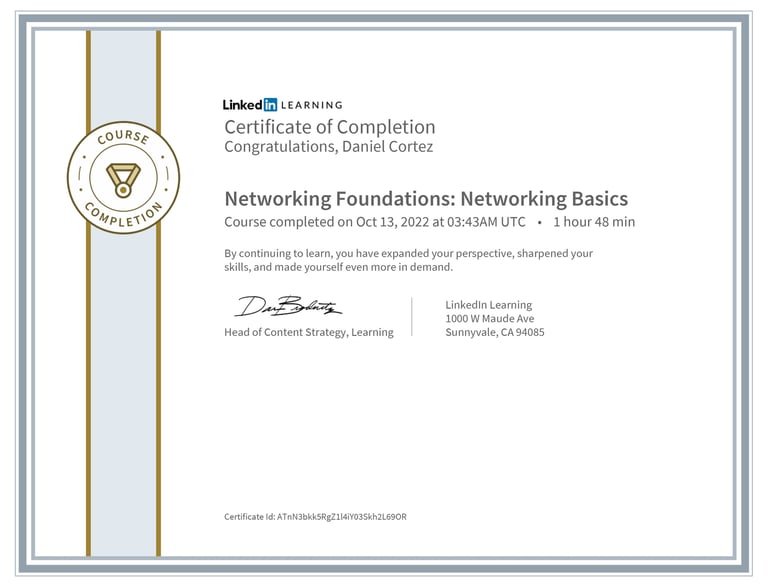

Computer networking plays a vital role in facilitating the communication required in almost every aspect of daily life. Activities like talking with friends and family, collaborating with coworkers, paying bills, and even completing transactions at a store often depend on some form of computer networking. Computer networking is defined as the connection of people through the use of devices and cables, and sometimes wireless signals. This week, you will learn about the basic types and shapes of networks and how they are used. You will also learn about wired connections, wireless connections, and network cables. And finally, you will learn about the advantages and disadvantages of each network type.
Learning Objectives
Identify the most popular network types and topologies
List wired connection types and their use cases
Identify common networking cables and their use cases
Describe examples for each wireless network type
Identify advantages and disadvantages of different network types
Networking and Storage Essentials
Issued by Coursera Authorized by IBM
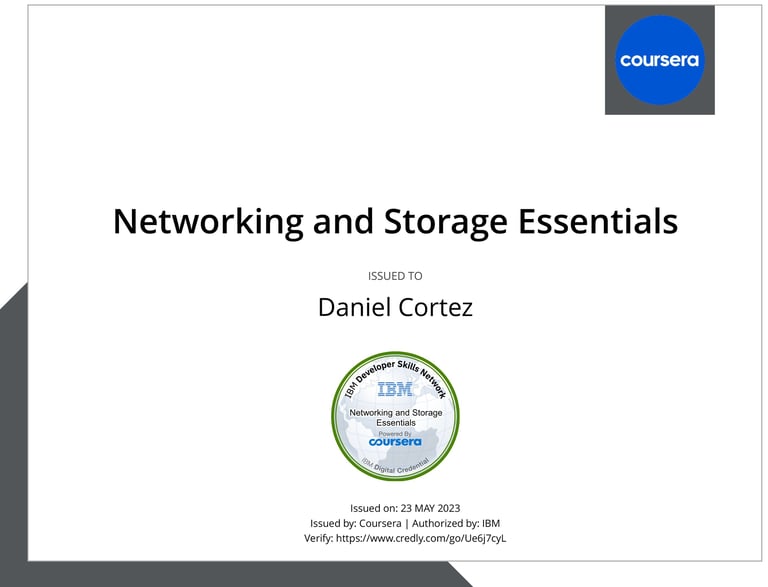

LEARNING OUTCOMES
Identify language associated with everyday
situations, such as studying, shopping, and
talking about time and schedulesDevelop confidence in key language items useful
in a range of different scenariosApply language skills for everyday conversations
Demonstrate understanding of relevant language
that can help the learner progress along the
path to studying at a university
Basic English 2: Pre-Intermediate
Future Learning Certificate of Completion
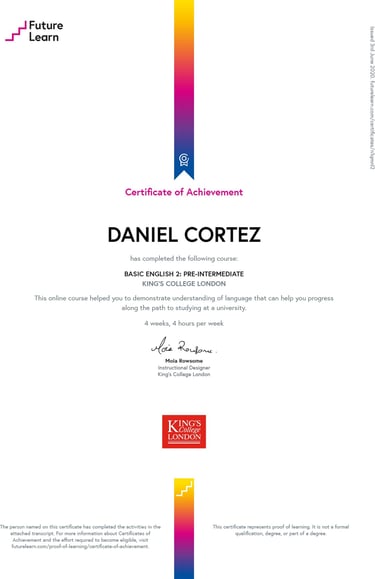

Questions?
Whether you’re curious about features, or vital information, we’re here to answer any questions.
